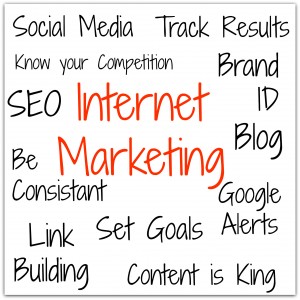Internet marketing is constantly evolving and it can be challenging for small businesses to keep up. We've compiled 5 approachable marketing tactics that every small business can benefit from.
Define Your Online Business Objectives
Set goals, track progress, measure results, and adjust strategies accordingly. Smart business decisions can only be made when you are on top of your website's performance. Every small business should use Google Analytics, which is a free and easy to use tool. With Google Analytics you can see fundamental web metrics including, but not limited to:
- Conversions: As defined by you.
- Acquisition: The platforms, websites, devices, and geographies your visitors are coming from.
- Traffic: Number of unique and new visits.
- Landing and exit pages
- Onsite activity: Where visitors are clicking on any given page and time spent on site.
Optimize for Organic Search
It's estimated that Google processes over one billion search queries a day. In order to succeed in such a web-centric and competitive marketing environment, it's critical for your website to return results for organic search. While many factors influence SEO, your website is your most valuable Internet marketing tool in this regard. If nothing else, make sure your site has a strong foundation with properly optimized page titles, meta descriptions, header tags, and site architecture. When it comes to SEO, the old adage is true, content is king: fresh and relevant content will help drive your SEO goals. Don't have the time, or can't make heads and tails of this all? WebSight Design can help your business optimize for organic search results.
Be Active in Social Media
There is no way around it, social media has become a new marketing paradigm. Simply stated, you are not in the game if you're not participating in social media to some degree. Whether it be Facebook, Twitter, Google+, Instagram, choose the platforms that are appropriate for your audience. You do not need to be active on all platforms but give it your all to the ones you are on. Regular engagement is key to an effective social media strategy. Don't know what to post? As a general guideline thing of the 80/20 rule. 80% of your posts should be valuable, relevant, sharable content. The other 20% can be the hard sell to your products and services. Remember that blogging is a form of social media "“ blogging adds fresh content to your websites, adds to your credibility, and improves your SEO.
Know Your Competition
One of the challenges and therefore, opportunities, about having an online business is that your competition is literally at the fingertips of your customers. The accessibility of the Internet also gives you open access to your competitors. Know what makes your business unique? Do you compete on the services you offer, price, and/or customer service. What features do your competitors' websites have that yours lacks? Sign up for your competitors' newsletters, follow their promotional calendars, and new product offerings. Watch your competitors on social media to gain additional insight into the market. Use Google Alerts to monitor your own online presence and to help you stay current on industry news and trends.
Be Consistent
While Internet marketing has unique facets, your overarching branding should be consistent both on and offline. The voice, tone, messaging, and creative assets you establish for your brand are integral to a successful and effective brand identity and strategy. If you have questions on any of the above, please contact us and we'll be more than happy to help.






